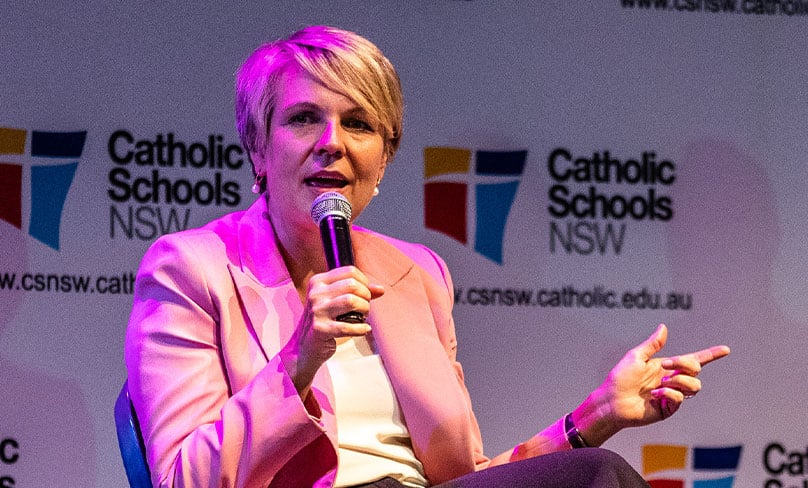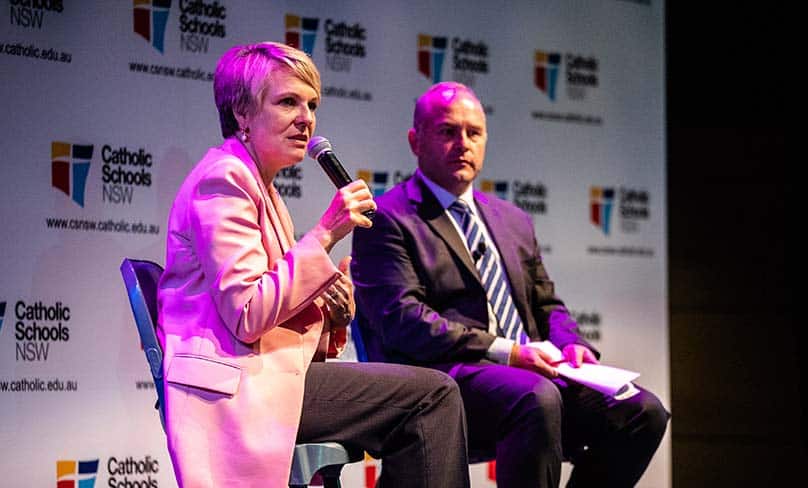
Labor’s shadow Education Minister, Tanya Plibersek, has said she is confident her party can uphold the freedom of religious schools to hire staff according to their ethos while also ensuring discrimination does not occur.
However, Ms Plibersek did not articulate how such a balance could be achieved.
Speaking at a forum attended by about 200 Catholic education leaders at Southern Cross Catholic College in Burwood, Ms Plibersek responded to a question from Catholic Schools NSW Chief Executive Office, Dallas McInerney, on how Labor’s proposed changes to the Sex Discrimination Act will impact faith-based schools.
Mr McInerney queried how the “tension” could be resolved between the rights of Catholic schools, as employers needing to fill teaching positions with people aligned with their ethos, and Labor’s plans to amend the Act to outlaw discrimination.
“I really don’t think there is a tension at all,” the Deputy Leader of the Opposition responded.
“I think it’s possible to find that balance where we don’t discriminate against people because of who they love or how they identify but that those people who are employees in an organisation have to faithfully represent the values of that organisation. I really don’t think that’s beyond us.”
Related story: Sydney bishop slams ALP abortion policy
Rather than explaining how the Labor Party intended to achieve that balance, Ms Plibersek instead focused on the desire of Catholic schools not to discriminate.
“I’ve had it made very clear to me that Catholic schools don’t want to discriminate against kids and they don’t want to discriminate against teachers.”
As someone who was raised a Catholic, Ms Plibersek said she did not believe that discrimination was compatible with the faith.
“I never heard my parents talk about discriminating against people. That is not how I was raised. That is not the Catholicism that I am familiar with and I think the sort of, the heat of that debate lost sight of that fact that people don’t want to discriminate.
“I probably shouldn’t get into the marriage equality debate but so many Catholics voted for marriage equality too because we’re taught that love is the most important thing, right.”

However, Dr Greg Walsh from the University of Notre Dame’s School of Law, warned earlier this year in The Catholic Weekly that the proposed changes to the Sex Discrimination Act could be profoundly detrimental to religious schools.
Dr Walsh was an upper house candidate for the Australian Conservatives in the NSW election in March but was unsuccessful.
“The changes could also limit the ability of religious schools to teach a traditional understanding of sexual ethics or that gender is determined by biology not emotions,” Dr Walsh wrote. “Teaching these doctrines may amount to imposing a detriment on students on the grounds of sexual orientation or gender identity.
“Similarly, a refusal to allow programs promoting gender fluidity to run in schools may be unlawful for limiting access to a benefit on the grounds of gender identity,” he wrote.
“It is important to note that those opposed to these amendments are committed to ensuring the welfare of all students at religious schools including those who are same-sex attracted or experiencing gender dysphoria.”
Related story: Federal Election Guide – Religious Freedom
“This commitment is clearly indicated by the many public statements expressing care for all students at religious schools from religious leaders, principals and other members of religious communities.
The proposed amendments were not enacted at the end of last year when they were put forward in Parliament.
The proposed changes have now been referred to the Australian Law Reform Commission to review. The ALRC’s report is due in June.
Education Minister Dan Tehan was invited to participate in the forum but declined the invitation, a CSNSW spokesperson said.
